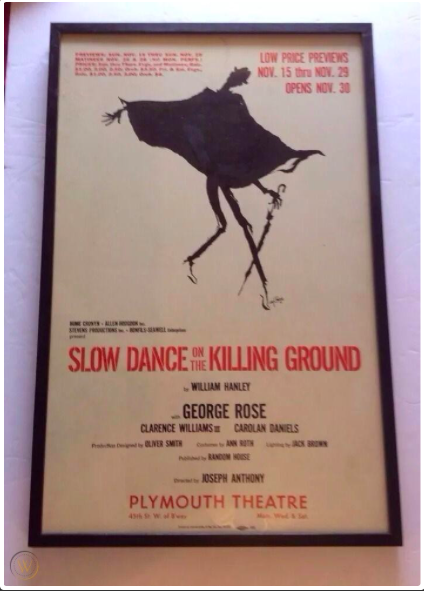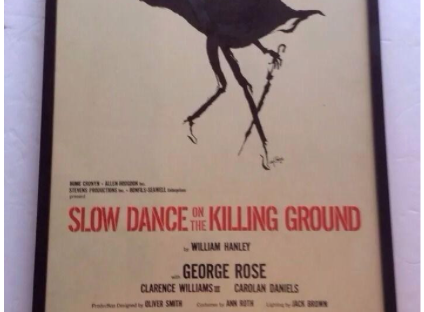Howdy! Welcome back Unknown Playwrights! Here we have some more Monologue Monday.
This week’s play is Slow Dance on the Killing Ground by William Hanley. The play is from 1964 and takes place in 1962.

I’m using the plot synopsis from the Dramatists Play Service:
As the curtain rises, a poor, dusty shop with its dirty window obscuring the dark hos-tile night, with its mean little counter, and with its juke box glaring vulgarly from the side, the storekeeper is taking inventory. The door is flung open, letting in a lithe young black man, weirdly gotten up in a soft, high-crowned hat, sunglasses, a cape, short slacks and sneakers. Mr. Hanley calls this act Pas de Deux. In this dance for two, the characters make hesitant approaches, circle, feint, threaten each other with gun and ice pick but scarcely make contact. The young man is obviously a hunted man. Through the circumlocutions of his odd mixture of jive talk and fancy literary allusions, there pants a sense of terror. The storekeeper is a non-Jewish refugee from Nazi Germany, is close-mouthed, suspicious, anxious to avoid self-involvement. In the second act, the Pas de Deux becomes Pas de Trois. The third dancer is Rosie, an eigh-teen-year old from Riverdale, has wandered into the shop after losing her way while looking for the address of an abortionist. Rosie has no illusions about her homeliness or about the encounter that has led to her troubles. The laconic German and the flowery young man react to her with a sensitivity and concern that seem to diminish the furies within them. But not for long. Finally the German is driven to revealing the truth about himself as the young man, at last, in the third act, faces his inexorable fate out there on the killing ground.
It looks like they haven’t updated the synopsis since ’64, either. Hehe.

The original play featured a young Clarence Williams III aka Linc from Mod Squad. Billy Dee Williams starred as Randall in the 1970 Off-Broadway revival.
Playwright Hanley was the nephew of two other successful writers, Gerald and James Hanley. His sister Ellen Hanley was a noted Broadway actress.
Hanley eventually had a successful career writing for television, especially TV movies. He was nominated for five Emmys and won two. Here are some links about him:
There are monologues for all three characters.
Rosie: If you knew me better…
Rosie has the misfortune of suffering from the “I got pregnant my first time” trope.
This monologue is available right here.
Rosie: If you knew me better, you’d see that this is exactly the kind of thing that’s likely to happen to me. Getting knocked up, I mean. The point is it was my first time, I was a virgin before that. Wouldn’t you know it, I’d get caught? Aside from everything else, I’m not lucky, either. You see, if I was lucky, Harold and I could’ve succumbed to our silly little passion and that would’ve been that, the end of it. And New Rochelle, of all places. At least if it’d been in some nice apartment in the Village, say, with the sound coming through the window of traffic and people, the breeze blowing the curtain over the bed, like in the movies. But no. I lost my virginity in the attic of an old house in New Rochelle. Harold’s grandmother’s house. On a rainy day in spring on the floor of the attic in his grandmothers house, listening to the rain on the roof, breathing the dust of old things…And what comes next but his grandmother who was supposed to be in the city for the day. But instead, she’s suddenly standing there, screaming: “Stop that! Stop that this instant!” Needless to say, it was out of the question. Stopping. At that particular moment. I mean, sex is like a flight over the sea, one reaches the point of no return…I guess it sounds funny now, but you know, at the time…it was pretty rotten. Sordid, I mean…it wasn’t at all the way it’s supposed to be. And Harold, of all people. A girl finds herself in this predicament, this condition, she’d at least like to think the cause of it was some clever, handsome guy with charm and experience, just returned from spending a year in Rome, say, on a Guggenheim fellowship. But Harold. Harold is six foot two, about a hundred and twenty five pounds, tops, and an Economics major at CCNY…That’s about the best I’ll ever be able to do, I know it. Ever since I found out I was pregnant I’ve been walking around with a face down to here and my mother kept saying, “What’s the matter with you, anyway? I just don’t know what’s gotten into you lately.” So, finally, I told her: a kid named Harold, as a matter of fact.
A
B
C
D
E
F
G
H
Glas: But I had a wife…
There is a male monologue in the play. And it might be a decent one for an older actor. Glas’ character survived the Holocaust.
He talks about those days, being a Gentile married to a Jew.

And there we have Slow Dance on the Killing Ground.
This last video is a filmed scene from the play.

